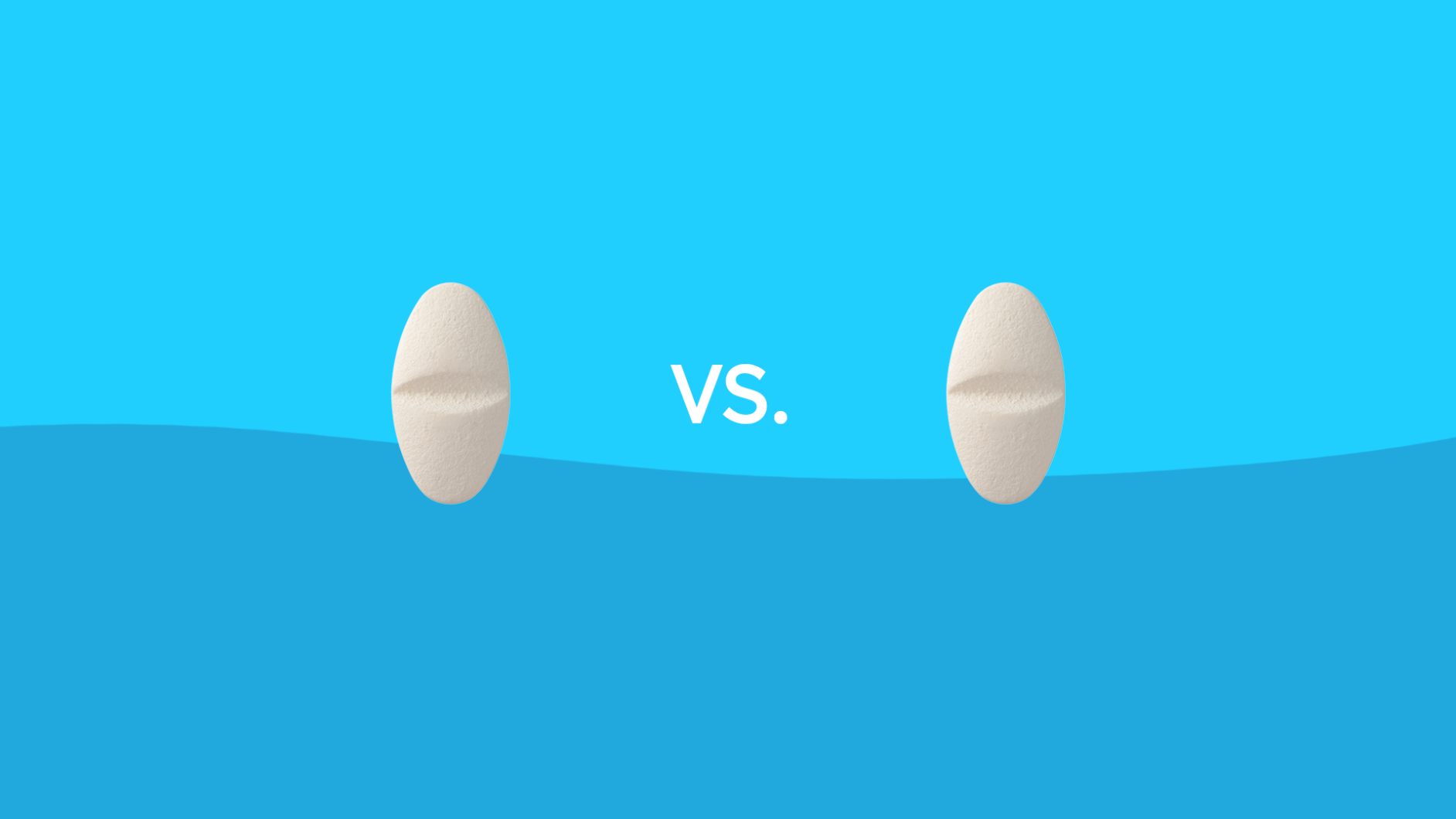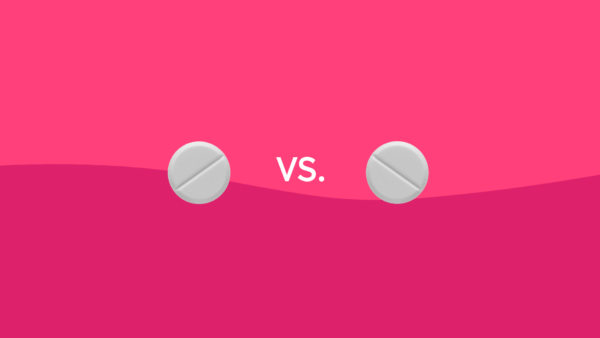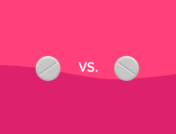Drug overview & main differences | Conditions treated | Efficacy | Insurance coverage and cost comparison | Side effects | Drug interactions | Warnings | FAQ
Lexapro (escitalopram) and Zoloft (sertraline) are SSRIs (selective serotonin reuptake inhibitors) indicated for the treatment of depression and other psychological conditions. An SSRI works by increasing serotonin levels in the brain, which helps improve symptoms. Both prescription drugs are approved by the Food and Drug Administration (FDA). Other drugs in the SSRI class of medications are Prozac (fluoxetine), Celexa (citalopram), and Paxil (paroxetine). Although Lexapro and Zoloft are similar, they have notable differences in their indications as well as cost.
RELATED: About Lexapro | About Zoloft | About Prozac | About Celexa | About Paxil
What are the main differences between Lexapro vs. Zoloft?
| Main differences between Lexapro vs. Zoloft | ||
|---|---|---|
| Lexapro | Zoloft | |
| Drug class | Selective serotonin reuptake inhibitor (SSRI) | Selective serotonin reuptake inhibitor (SSRI) |
| Brand/generic status | Brand and generic | Brand and generic |
| What is the generic name? | Escitalopram oxalate | Sertraline hydrochloride |
| What form(s) does the drug come in? | Tablet and liquid | Tablet and liquid |
| What is the standard dosage? | Adults: 10 mg daily; maximum 20 mg per day (maximum 10 mg per day in elderly) Adolescent: varies; average of 10 mg daily Taper gradually when discontinuing |
Adults: 50-200 mg daily; maximum 200 mg per day Children: varies; average of 25 to 50 mg daily Taper gradually when discontinuing |
| How long is the typical treatment? | 6 months to 1 year; many patients continue for years | Varies; months to years |
| Who typically uses the medication? | Adolescent to adult; sometimes prescribed off-label for children 6 and older | Ages 6 to adult |
Conditions treated by Lexapro and Zoloft
Lexapro is an SSRI indicated for acute and maintenance treatment of major depressive disorder (MDD) in adolescents aged 12-17 years and adults, and acute treatment of generalized anxiety disorder (GAD) in adults.
Zoloft is an SSRI indicated for the treatment of major depressive disorder (MDD), obsessive-compulsive disorder (OCD), panic disorder (PD), post-traumatic stress disorder (PTSD), social anxiety disorder (SAD), and premenstrual dysphoric disorder (PMDD).
| Condition | Lexapro | Zoloft |
| Major Depressive Disorder (MDD) | Yes | Yes |
| Generalized Anxiety Disorder (GAD) | Yes | No |
| Obsessive-compulsive disorder (OCD) | No | Yes |
| Panic disorder (PD) | No | Yes |
| Post-traumatic stress disorder (PTSD) | No | Yes |
| Social anxiety disorder (SAD) | No | Yes |
| Premenstrual dysphoric disorder (PMDD) | No | Yes |
Is Lexapro or Zoloft more effective?
Lexapro was shown in clinical studies to be significantly more effective than placebo in the treatment of Major Depressive Disorder and Generalized Anxiety Disorder.
Zoloft was shown in clinical studies to be significantly more effective than placebo in the treatment of major depressive disorder, panic disorder, PTSD, OCD, SAD, and PMDD.
A 2014 study published in International Clinical Psychopharmacology suggested that Lexapro may be more effective and better tolerated than Zoloft or Paxil. Lexapro has different binding site interactions which may lead to better efficacy and tolerability. However, another study found that Zoloft led to outcomes that were at least as good as or better than patients using Lexapro or Celexa in terms of adherence, drug costs, and medical spending.
The most effective medication, though, should only be determined by your doctor taking into account your medical condition(s), medical history, and other medications you are taking.
Want the best price on Zoloft?
Sign up for Zoloft price alerts and find out when the price changes!
Coverage and cost comparison of Lexapro vs. Zoloft
Lexapro is typically covered by both insurance and Medicare Part D, the generic will have a much lower copay, whereas brand name may have a much higher copay or may not be covered at all. Lexapro is available in 5, 10, or 20 mg tablets (brand or generic) and as a liquid in 5 mg/5 ml oral solution (generic). Lexapro costs about $379 for 30 tablets of 10 mg brand name tablets; the Medicare Part D copay for generic (10 mg, 30 tablets) typically ranges from $0-30, and with a SingleCare card you can expect to pay $9 to $45 depending on your pharmacy.
Try the SingleCare prescription discount card
Zoloft is typically covered by both insurance and Medicare Part D, generic will have a much lower copay, whereas brand may have a much higher copay or not be covered at all. Zoloft is available in 25, 50, or 100 mg tablets (brand or generic) and as a liquid in 20 mg/ml oral solution (generic). Zoloft costs about $365 for 30 tablets of 100 mg brand name tablets; the Medicare Part D copay for generic (100 mg, 30 tablets) typically ranges from $0-13, and with a SingleCare card you can expect to pay $9 to $31.
| Lexapro | Zoloft | |
| Typically covered by insurance? | Yes | Yes |
| Typically covered by Medicare Part D? | Yes (generic; brand may have a high copay or may not be covered) | Yes (generic; brand may have a high copay or may not be covered) |
| Standard dosage | 5, 10, or 20 mg tablets (brand or generic), 5 mg/5 ml oral solution (generic) | 25, 50, or 100 mg tablets (brand or generic), 20 mg/ml oral solution (generic) |
| Typical Medicare copay | $0-30 (generic) | $0-13 (generic) |
| SingleCare cost | $9-45 | $9-31 |
Common side effects of Lexapro and Zoloft
Both drugs have a long list of serious warnings, which are included in the warning section below. Additionally, you may experience other, more common adverse effects from Lexapro or Zoloft.
The most common adverse reactions of Lexapro are headache, upset stomach/nausea, sexual dysfunction/ejaculatory delay, insomnia, fatigue, and sleepiness.
The most common adverse reactions from Zoloft are nausea, diarrhea, sexual dysfunction/ejaculatory delay, dry mouth, insomnia, and sleepiness.
Want the best price on Lexapro?
Sign up for Lexapro price alerts and find out when the price changes!
Side effects vary; this is a partial list. A medication guide will be given to you with a new or refill prescription of Lexapro or Zoloft with information about side effects and other warnings. Consult your healthcare professional for a complete list of side effects.
| Lexapro | Zoloft | |||
| Side Effect | Applicable? | Frequency | Applicable? | Frequency |
| Headache | Yes | 24% | Yes | % not given |
| Nausea | Yes | 18% | Yes | 26% |
| Diarrhea | Yes | 8% | Yes | 20% |
| Ejaculation disorder | Yes | 14% | Yes | 8% |
| Dry mouth | Yes | 9% | Yes | 14% |
| Sleepiness | Yes | 13% | Yes | 11% |
| Insomnia | Yes | 12% | Yes | 20% |
Source: DailyMed (Lexapro), DailyMed (Zoloft)
Drug Interactions of Lexapro vs. Zoloft
Because both drugs are in the same category, they have similar drug interactions.
MAO inhibitors such as selegiline should not be used within 14 days of Lexapro or Zoloft; the combination may increase the risk of serotonin syndrome, a life-threatening medical emergency due to a buildup of serotonin.
Triptans used to treat migraines, such as Imitrex (sumatriptan), as well as other antidepressants, such as Elavil or Cymbalta, should not be used in combination with Lexapro or Zoloft due to the risk of serotonin syndrome.
Other drugs that may interact with Lexapro or Zoloft include macrolide antibiotics such as Zithromax, NSAIDs (non-steroidal anti-inflammatory drugs) such as Mobic, or painkillers such as Ultram.
Alcohol should not be used with Lexapro or Zoloft.
| Drug | Drug Class | Lexapro | Zoloft |
| Eldepryl (selegiline), Parnate (tranylcypromine) | MAOIs (Monoamine oxidase inhibitors) | Yes | Yes |
| Alcohol | Alcohol | Yes | Yes |
| Imitrex (sumatriptan), etc | Triptans/selective serotonin receptor agonists | Yes | Yes |
| Coumadin (warfarin) | Anticoagulants | Yes | Yes |
| St. John’s Wort | Supplement | Yes | Yes |
| Ultram (tramadol) | Painkiller | Yes | Yes |
| Zithromax (azithromycin), Biaxin (clarithromycin), erythromycin | Macrolide antibiotics | Yes | Yes |
| Motrin (ibuprofen), naproxen, Mobic (meloxicam) | NSAIDs | Yes | Yes |
| Effexor (venlafaxine), Cymbalta (duloxetine), Pristiq (desvenlafaxine) | SNRIs | Yes | Yes |
| Elavil (amitriptyline), Pamelor (nortriptyline) | TCA (tricyclic antidepressants) | Yes | Yes |
This is not a complete list of drug interactions. Consult your healthcare provider for medical advice.
Warnings of Lexapro and Zoloft
Both Lexapro and Zoloft come with an FDA black box warning for antidepressants and suicidality. Children, adolescents, and young adults (up to age 24) taking antidepressants have an increased risk of suicidal thoughts and behavior. All patients on antidepressants should be carefully monitored.
Other warnings with both drugs include:
- Risk of serotonin syndrome: A life-threatening medical emergency caused by the buildup of too much serotonin. Patients should be carefully monitored for symptoms including hallucinations, seizures, and agitation.
- Discontinuation: When discontinuing one of these medications, symptoms such as agitation may occur; patients should taper off the drug very slowly.
- Seizures: In patients who have seizures, Lexapro or Zoloft should be used with caution.
- Hyponatremia (low sodium) due to syndrome of inappropriate antidiuretic hormone secretion (SIADH): Patients may experience headache, difficulty concentrating, memory impairment, confusion, weakness, and unsteadiness, which may lead to falls. More serious cases can occur. Patients should seek emergency treatment if symptoms occur, and the SSRI should be stopped.
- Angle-Closure Glaucoma: SSRIs should be avoided in patients with untreated anatomically narrow angles.
- Bleeding: SSRIs may increase bleeding risk; risk increases with concomitant use of aspirin, NSAIDs, or warfarin.
- Activation of mania or hypomania: In patients with bipolar disorder, an antidepressant may precipitate a mixed/manic episode.
Lexapro or Zoloft should only be used in pregnancy if the benefit to the mother is greater than the risk to the baby. Stopping the medication may cause a relapse of depression or anxiety. Therefore, patients should be evaluated on a case-by-case basis.
If you are already on Lexapro or Zoloft and find out you are pregnant, contact your healthcare provider immediately. Lexapro or Zoloft should be used with caution in breastfeeding mothers, and the baby should be evaluated for any adverse reactions.
Zoloft oral solution contains 12% alcohol and should not be used while pregnant or breastfeeding, because of the alcohol content.
Frequently asked questions about Lexapro vs. Zoloft
What is Lexapro?
Lexapro (escitalopram) is an SSRI indicated for acute and maintenance treatment of major depressive disorder (MDD) in adolescents aged 12-17 years and adults, and acute treatment of generalized anxiety disorder (GAD) in adults.
What is Zoloft?
Zoloft (sertraline) is a selective serotonin reuptake inhibitor indicated for treatment of major depressive disorder (MDD), obsessive-compulsive disorder (OCD), panic disorder (PD), post-traumatic stress disorder (PTSD), social anxiety disorder (SAD), and premenstrual dysphoric disorder (PMDD).
Related: Zoloft for anxiety
Are Lexapro vs. Zoloft the same?
Lexapro and Zoloft are both SSRI medications, but their indications vary (see above). Because they are in the same category, they have many of the same drug interactions and side effects.
Is Lexapro vs. Zoloft better?
It depends. Each medication has different indications; one may be more appropriate for your condition(s). Consult your healthcare provider to help you determine which medication is better for you.
Can I use Lexapro vs. Zoloft while pregnant?
It depends. Consult your healthcare provider for advice. Your doctor will weigh the benefits of taking an antidepressant vs. the risk to the baby. Some doctors will prescribe a low dose of antidepressant while pregnant. If you are already on Lexapro or Zoloft and find out that you are pregnant, consult your OB/GYN immediately for advice. If you are breastfeeding, consult your OB/GYN as well.
Can I use Lexapro vs. Zoloft with alcohol?
No. Combining antidepressants with alcohol can worsen symptoms of depression or anxiety, impair your thinking and alertness, and increase sedation and drowsiness.
Which is the best SSRI for anxiety?
SSRIs can be very useful in the treatment of anxiety, but it is best to consult with your healthcare provider about which one is best for you, taking into account your medical history, medical condition(s), and other medications you are taking.
Does Lexapro or Zoloft cause more weight gain?
Everyone has a different experience; some people have no change in weight, and some may gain or lose some weight while on these medications.





